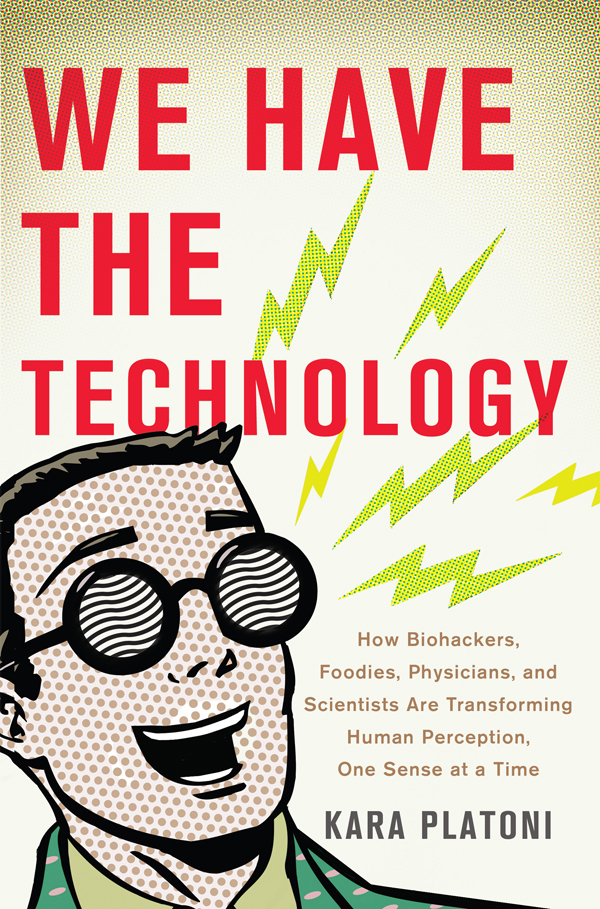
We Have the Technology
How Biohackers, Foodies, Physicians, and Scientists Are Transforming Human Perception, One Sense at a Time
کتاب های مرتبط
- اطلاعات
- نقد و بررسی
- دیدگاه کاربران
نقد و بررسی

Starred review from October 19, 2015
“Nature is amazing,” but “couldn’t it be more so?” asks science journalist Platoni in this enthusiastic review of research into human senses and ways they might be improved. Platoni converses with scientists who seek to learn how humans perceive the world by examining the nervous system and genes. Her chapters on taste, smell, touch, and emotion are wholly engrossing. Humans, it turns out, are able to taste more than the usual palate of sweet, bitter, salt, sour, and umami; and smell, memory, and culture are almost too integrated to tease apart. Equally surprising is the fact that the brain often treats physical and emotional pain identically. Platoni describes how today’s crude eye and ear implants restore function to those without it; in the future an eye implant might detect infrared or ultraviolet light, and its sensors could be hooked up to distant cameras or a rewind button. Similarly, an artificial ear could be designed to hear much higher frequencies or echo-locate. Platoni also profiles some
of the dedicated amateur “biohackers” and the gruesome experiments they’re apt to conduct on themselves. This is a superb account of human perception and the first, clunky but potentially breathtaking efforts to expand it. Agent: Gillian MacKenzie, Gillian MacKenzie Agency.

October 15, 2015
A veteran science reporter examines the many innovative developments of human sensory enhancement. Platoni took a year off from teaching narrative writing and reporting at the University of California to immerse herself in modern bioscience and the aspects of technology-mediated human metaperception. She emerged with notebooks filled with interviews about how to broaden our sensory experiences to "make the world feel real." Consistently fascinating, witty, and candid, Platoni's sensorial tour begins with the scientific and technological tinkering within the realm of the five senses, and then she moves on to aspects of pain and emotion. All of the sensory chapters offer captivating and memorably relevant information including a visit to a Denver lab experimenting on the taste detection of fatty acids and measuring the physiological responses, the research of French olfactory experts analyzing the restorative powers of smell on memory-deficient Alzheimer's patients, revolutionary retinal implants in Los Angeles, and adventures in robotic surgery and prosthetic limbs. One commonality among these food scientists, geneticists, biohackers, entrepreneurs, perfumers, and engineers is the competitive nature and time sensitivity of their quests to discover the next trending flavor combination, sound quality, visual experience, artificial intelligence, or even a "sixth taste." In the second half of the book, the author delves into the development, utilization, and learning experiences shared by augmented reality and metasensory experiences. Segments on time and pain perception are both riveting and worrisome as innovators collaborate to develop a 10,000-year clock, neurobiologists examine time on a cellular level, and impressions of heartsickness and random physical agony are openly shared from a bartender and her patrons at an iconic San Francisco barroom. Platoni's update on virtual-reality gadgetry is no less intriguing. While the author's analyses raise tough questions about the increasing need to subvert and expand reality--are we relentlessly exploratory or just bored?--the ways in which scientists are accomplishing this are utterly spellbinding. Engrossing techno-science delivered with gusto and sure to reach a varied audience.
COPYRIGHT(2015) Kirkus Reviews, ALL RIGHTS RESERVED.

January 1, 2016
The overarching theme of this book is perception: What do we, as humans, perceive and how do we experience more? To explore this, Platoni (journalism, Univ. of California, Berkeley) covers both how senses are applied and the ways in which scientists and enthusiasts are pursuing ways of improving the senses. Mostly, this means assistive technology for people with disabilities. However, Platoni's approach is not the most enlightened when it comes to "fixing people." The initial chapters on the five senses cover the "soft" biohacking of cultural forces such as language and how they shape a perception of reality. The middle chapters on observations of time, pain, and emotion are more nebulous and seem somewhat out of place, except that they discuss the brain. The final section considers using technology to create or extend the sensory environment, which includes wearables such as virtual reality gear but also embedded devices that "hard" biohackers place inside their bodies in an effort to create new senses. VERDICT All readers will find something in this journalistic text that doesn't shy away from tough issues such as privacy and trauma. Fans of Elizabeth Moon's "Vatta's War" series will enjoy learning about the current state of biohacking implants.--Cate Hirschbiel, Iwasaki Lib., Emerson Coll., Boston
Copyright 2016 Library Journal, LLC Used with permission.

December 15, 2015
Biohackers, cyborgs, transhumanists, perfumers, and picklersthese are just a few of the odd and inventive characters we meet in this fascinating, often mind-boggling report on the fast-growing world of sensory science from award-winning journalist Platoni. She begins with the five human senses, checking in with researchers who are working hard to discover another dimension of taste beyond basic ones such as sweet and sour; visiting laboratories where scents are manipulated to trigger childhood memories; and meeting self-described grinders who modify their bodies in some radical, sense-enhancing way, like Rob Spence, aka Eyeborg, whose right eye socket harbors a camera that perpetually records his experiences. In addition to interviewing scientists learning to manipulate hearing, touch, and even the sense of time, Platoni also interviews virtual-reality developers and entrepreneurs determined to put the tools for augmenting perception within everyone's reach. Sometimes glowingly optimistic, and sometimes unnerving, Platoni's overview previews a fast-approaching future of widespread sensory manipulation that demonstrates humankind is truly on the cusp of tinkering with its own evolution. (Reprinted with permission of Booklist, copyright 2015, American Library Association.)

























دیدگاه کاربران